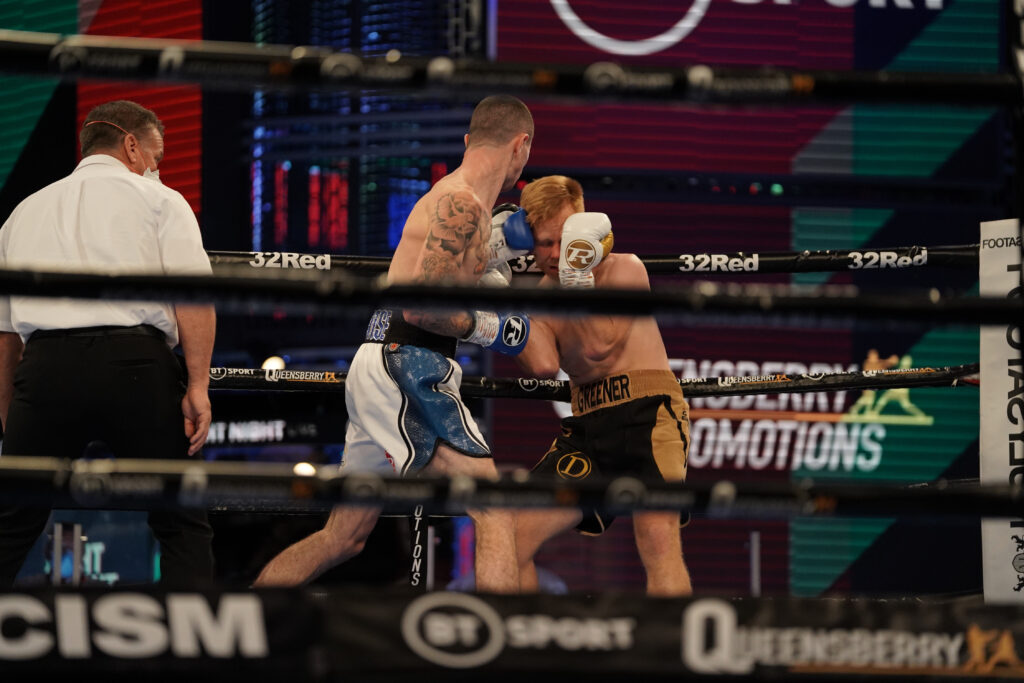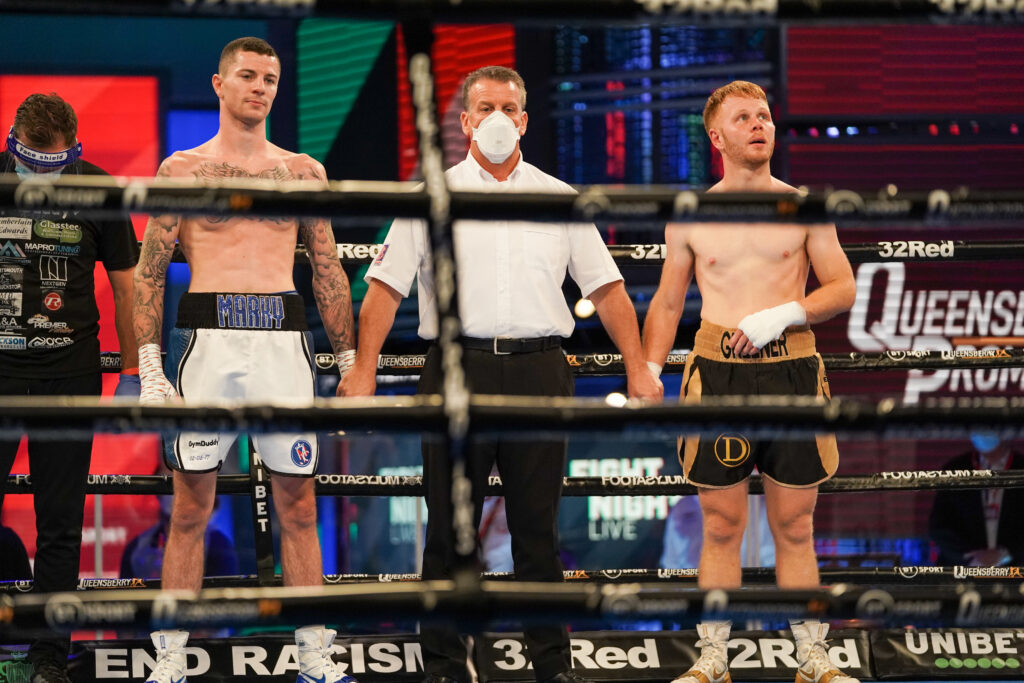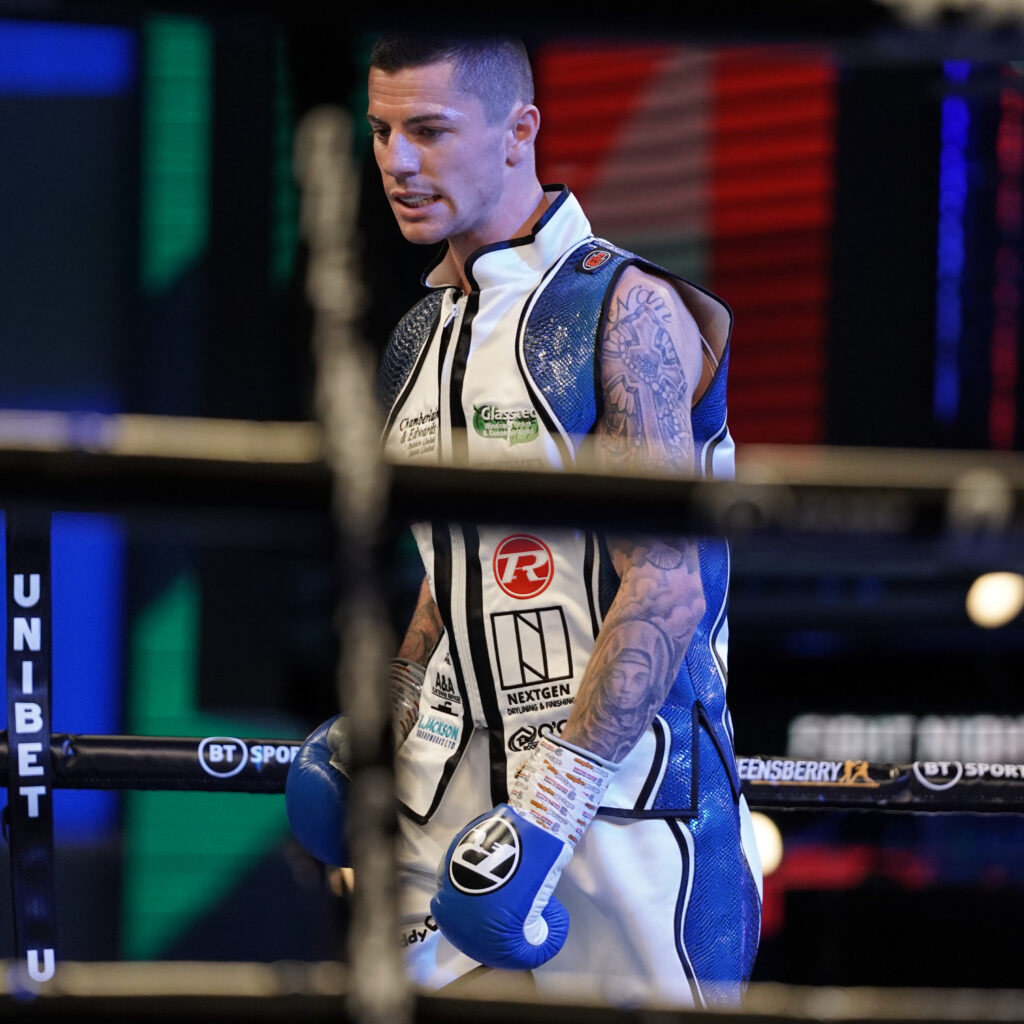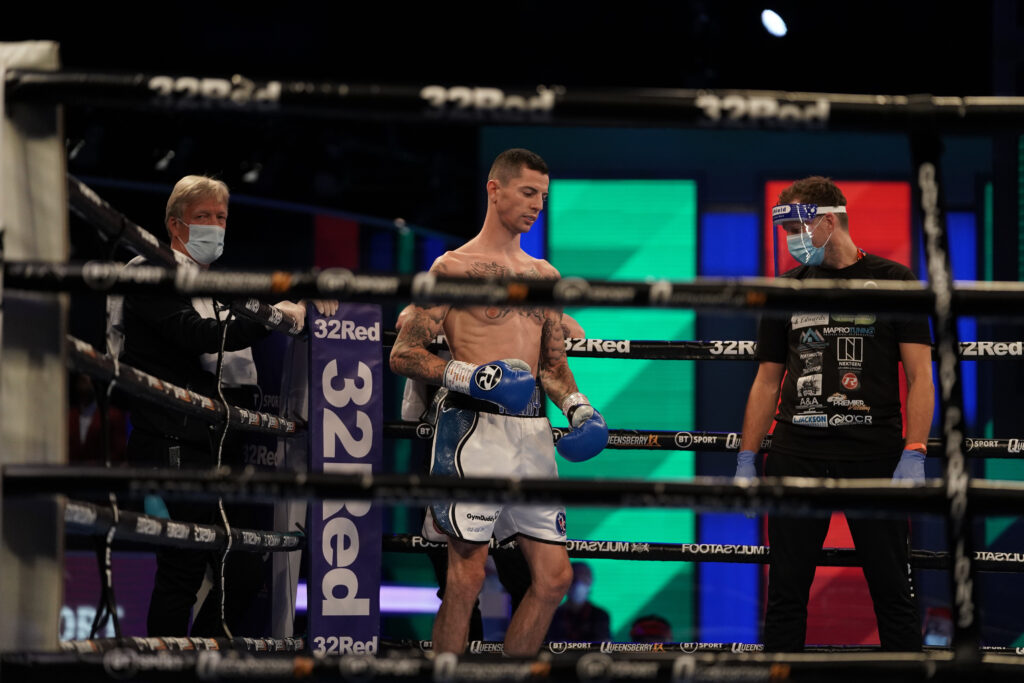While the outbreak of Covid-19 has disrupted many high-profile boxers’ plans for the year, it has resulted in unexpected opportunities for fighters in the infancy of their careers. Each of the first four shows staged in England since boxing returned from its four-month hiatus featured at least one fighter having their first live televised fight.
One fighter who seized his chance was Mark Chamberlain (6-0, 4 KOs). The Portsmouth puncher required less than a minute to despatch of Stu Greener. His opponent may not have been expected to win, but Greener was believed to be a small step up in class having previously defeated the then-unbeaten Tyler Davies, and Nathaniel Wilson, son of Chris Eubank Sr.
Greener looked confident that he could pull off another upset, taking the fight to Chamberlain from the opening bell. Aggression would be Greener’s downfall, as he left himself open to a left hook from Chamberlain which staggered him. Chamberlain knew he had his man hurt. A barrage of shots sent Greener to the canvas. Greener beat the count, but an unanswered volley of punches obliged referee, Michael Alexander, to halt the contest.

blew away Greener. Photo: Queensberry Promotions.
The 21-year-old lightweight’s display of ruthless efficiency earned rave reviews from some of the most knowledgeable observers of the sport including International Boxing Hall of Fame inductee, Graham Houston, who named Chamberlain as one of his ten fighters to watch in his column for Boxing Social.
Another fan was David Haye who was working as a ringside analyst for BT Sport on the broadcast. The former unified cruiserweight champion gave Chamberlain a glowing review.
When Boxing Social caught up with Chamberlain, he agreed with Haye’s assessment of his performance, but believes the best is yet to come.
“It couldn’t have gone better for me,” said Chamberlain. “There were no punches wasted at all. Like David Haye said, it was a punch perfect performance. I think I done really well. I normally stand there and go, ‘I could have done this, I could have done that,’ but I think every punch counted. The only thing is everyone was saying I was a bit too aggressive and out of order,” he said with a laugh before continuing.
“I’ve had six fights now and I’ve just managed to get on TV. I think I should have been on TV a lot earlier, but I’m not in no position to pick and choose and run my mouth off with what I want. I think I’ve opened up a lot of eyes now and people know what I’m about. I think I’ll get a lot more recognition from everyone now.”

Photo: Queensberry Promotions.
One of the most impressive aspects of Chamberlain’s performance was that not only was he facing the pressure of participating in his first televised bout, but he was also involved in the first fight on British shores post-lockdown.
As such, he was required to isolate in the hotel that Frank Warren was utilising as the ‘Bubble’ for the show, for the majority of fight week.
Usually, Chamberlain would have a strong support in attendance for his contest, but due to the safety protocols implemented by the British Boxing Board of Control, the fight took place in a near-empty BT Sport studio, in Stratford.
Despite the alien surrounding, the laid-back Chamberlain was unperturbed by the experience.
“To be honest, it felt completely normal for me to be first because I would normally be on early anyway,” he said of being the sport’s guinea pig. “Despite the fact that it was my TV debut, I didn’t think nothing of it, just, ‘You are on first, get it done, get out and go back to your hotel’.
“I wouldn’t say it was like sparring because in the gym there’s normally a lot more people there! If you are sparring a good boy they bring a fair bit of people with them and there’s a few boys in the gym, but in the BT studio all that was there was the cameraman, the commentators, my trainer [Wayne Batten], the other trainer and Robert Warren. I couldn’t see anybody else. It was a bit quiet. It was different because when there is no sound, you can hear every punch that landed. When you watch the video back, you can hear everything. It was a bit strange, but I’d do it again. It doesn’t put me off boxing in a little place like that. It’s different but you block it all out and ignore it.”

Photo: Queensberry Promotions.
It is not just fighting in a TV studio that Chamberlain is willing to do again, he is also prepared to endure the rigorous control measures. Chamberlain would usually have his family and friends nearby in the days and hours ahead of a fight, but due to the restrictions, this was impossible.
Under normal circumstances, he would arrive early at the venue, have plenty of time to warm-up, fight and watch the rest of the card. However, the current circumstances are anything but normal and, as such, Chamberlain’s pre and post-fight routine was markedly different.
“When we got in the taxi, we had to put a mask on and some latex gloves to travel to the venue two miles up the road,” he said. “When we got to the venue, we had to chuck our mask and gloves that we just put on in the bin, put clean ones on when we got there. We had our temperature checked as we went through the door. We went straight to…” Chamberlain paused as he tried to find the words to best describe the makeshift changing facilities.
“I wouldn’t even call it a dressing room. It was a tiny little room with black sheets around so no one can see in there. If you went anywhere you had to put a mask on to walk around. That side of it was a bit strange. Usually, you have a few people there and people coming in to wish you luck, but you couldn’t have none of that because there’s no one there!
“You aren’t even allowed to hang about there afterwards. I couldn’t even get changed at the venue, they made me grab my bag, get in the taxi and go home. I asked, ‘Can I get changed?’ They said, ‘No, you’ve just got to go’. I had everything on, I just got out of the ring, I even had my gumshield in my hand! I had to walk through the Westfield shopping centre with my boxing boots on, my shorts and my ring jacket! Everyone was looking at me as if to say, ‘What’s going on?’”
Of course, not even strangers gawking at him as he walked through public places in boxing shorts fazed the Portsmouth portsider. The youngster possesses a resolute self-belief and knows his own mind. This mindset was evident as an amateur when he felt under-appreciated by the Team GB set-up.
Having won three national titles as an amateur, Chamberlain had been on the radar of the national team set-up for a number of years but was constantly left frustrated by a lack of opportunities. As such, when he captured the National Elite Championship at 60kg, in 2018, he felt he had achieved all he wanted to in the unpaid ranks and opted to turn professional.
“I’d get phone calls to go up to Sheffield to do training for the Three Nations and other competitions,” he said. “There would be other boys there at the same weight, bearing in mind that they haven’t won the championships at that weight, but because they were a favourite, they’d get picked over me. It was like I was there to make up the numbers for sparring.
“When I was 15, I couldn’t turn pro, so I carried on doing what I was doing. The next year, I won [the national title] again. I was still getting these phone calls and they were still picking people over me. In the end, I thought, ‘I’m a senior now. I could do with a Senior Elite title and that will be me done, I’ll turn over’. I managed to get a senior title and thought, ‘I’m old enough and big enough to make my own decisions’. I was being used on the England squad, so I thought, ‘I’ve had enough of it now’.”

Photo: Queensberry Promotions.
Even now, Chamberlain has a clear plan. While often coaches and managers have to curb the exuberance of youth, as prospects champ at the bit to progress through the levels quickly, that is not the case with Chamberlain. He is confident he has the ability to compete at a much higher level, but acutely aware that he has much to learn and time on his side.
Unusually, the 21-year-old has already formulated his exit strategy from the sport. He has witnessed too many fighters suffering the ill-effects of their chosen profession. Chamberlain is adamant he will be different.
If his dream comes to fruition, he hopes to be able to help others during his early retirement.
“I’m only 21 years old, so I don’t want to be rushing nothing just yet,” he said. “There’s a lot of blokes who’ve been in the game for years and I don’t want to ruin what I’ve got going when I’ve got plenty of time left. I’d like to get to the top and get out so, touch wood, nothing happens to me. I’d like to win a world title then that would be me out of the game before anything on the worse side of it could happen to me.
“I’d like to open up a gym in the local area for kids, just to get them off the streets. That’s what I’d look into doing. I’d do a bit of training in there for the kids, but I’d rather get people in there. I’d supply the gym for them to use. I’d like to help a lot of people out. I’d look after my family. The main thing is to get kids of the streets. It’s something I’d like to do for the community.”
While Chamberlain has patience where his career is concerned, that does not extend to all facets of life. The global pandemic did not perturb ‘Marky Boy’; however, the initial panic-buying and social distancing restrictions in retail shops did manage to frustrate him.
“I know it’s a big thing, this Coronavirus and it’s serious, but you’ve got to get on in life,” he said. “It hasn’t really affected me. I think the queuing up is a load of rubbish, but otherwise it hasn’t affected me. I don’t like stopping at a red light in my car, never mind queuing up behind a hundred people!”
Perhaps that explains Chamberlain’s eagerness to stop Stu Greener as quickly as he did.
“If you’ve got them hurt, finish them off,” he said. “You don’t get paid overtime. They all say, ’You hit ‘em like they stole something off you’. They ain’t stealing my 0!”